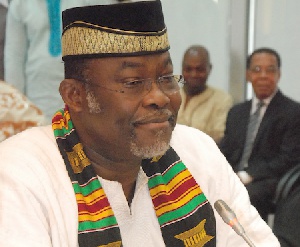- Home - News
- TWI News | TV
- Polls
- Year In Review
- News Archive
- Crime & Punishment
- Politics
- Regional
- Editorial
- Health
- Ghanaians Abroad
- Tabloid
- Africa
- Religion
- Election 2020
- Coronavirus
- News Videos | TV
- Photo Archives
- News Headlines
- Press Release
Business News of Thursday, 19 March 2015
Source: GNA
Ghana’s power deficit offers great investment opportunities
Ghana’s power deficit represents enormous opportunities for foreign direct investment as well as public-private partnerships in the energy sector, Minister of Trade and Industry, Ekwow Spio-Garbrah, has declared to some 600 top global business leaders attending the Africa CEO Forum in Geneva, Switzerland.
According to Dr. Spio-Garbrah, the deficit of some 500 megawatts of power and the projections for additional power demand in Ghana has led to more than 20 proposals being submitted by a wide range of companies from the US, Germany, Denmark, India, China, South Africa, Turkey, Brazil and others for thousands of megawatts of additional generation.
These projects are from all sources of energy, including gas, coal, wind, solar, biomass, waste-to-energy, mini-hydro and even sea wave. On account of these developments, Dr. Spio-Garbrah was convinced that the medium term prospects for Ghana’s industrialisation were good.
Dr. Spio-Garbrah was speaking at the Africa CEO Summit, an annual conference of the CEOs of major African enterprises and top executives from global companies interested in Africa. The conference was organized by the Paris-based publishing firm, Groupe Jeune Afrique, with support from the African Development Bank and numerous other private sponsors.
Speaking on the subject of: “The African Urban Explosion: Turning Challenges into opportunities”, Dr. Spio-Garbrah noted that while rapid urbanization and the growing slums in some African cities were a cause for concern and needed better planning and management, the urbanization also offered numerous investment opportunities.
The Minister for Trade and Industry indicated that if investors considered the human life cycle, “from birth to death or from cradle to grave”, or even the average person’s daily needs, opportunities for investment in the urban communities of a country such as Ghana ranged from housing to transportation, to shopping centres, food supply, building and office equipment and supplies, and utilities. Increasingly, for major public investments in utilities such as water, sewerage, sanitation and water treatment, and waste disposal and management involved various models of public-private partnerships.
Dr. Spio-Garbrah described Ghana as a country with the second-highest penetration of power to the general population, at 76% of the population, second only to South Africa in sub-Saharan Africa, 80% of whose population had access to electricity.
Dr. Spio-Garbrah explained that Ghana’s rural electrification project is a major success factor to Ghana’s capacity for rural industrialization.











